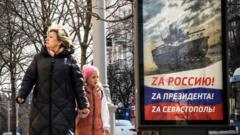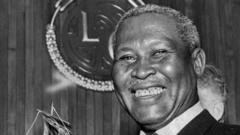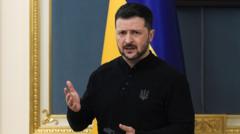Despite the risks, brave Ukrainian women are standing firm against Russian attempts to erase their national identity and traditions.
**Voices of Defiance: Ukrainian Women Resist Russian Occupation**

**Voices of Defiance: Ukrainian Women Resist Russian Occupation**
Women in occupied Ukraine share their struggles against repression amid wartime hardships.
In the shadow of Russian occupation, Ukrainian women are silently resisting severe repression and the attempts to erase their culture. A woman named Maria, a member of an underground resistance group, reveals the chilling atmosphere in occupied territories where everything Ukrainian is targeted for prohibition. “Russians are trying to ban everything Ukrainian here: language, and also traditions. Even Ukrainian holidays are forbidden,” she says, voicing fears for the future of her homeland.
As the US engages in diplomatic efforts for peace in Ukraine, those living under Russian control confront an oppressive regime that enforces strict limitations on freedom of expression and enforces punitive measures against dissent. With escalating concerns over potential territorial concessions as part of peace negotiations, the residents fear losing crucial aspects of their identity and heritage.
Maria’s life in an undisclosed location showcases her courage as she and her peers distribute leaflets and newsletters to raise awareness of the dire conditions they face. The repressive local administration employs intimidation tactics, including surveillance and strict penalties for perceived dissent, forcing many to tread carefully when discussing their experiences or feelings about the Russian occupation.
The anxiety is palpable among families divided by occupation; a significant number of Ukrainians living under Russian rule express desperation and fear when communicating with loved ones. Sofia, a woman whose parents remain in an occupied village, recounts the anguish of their situation post-surveillance by Russian authorities. "They accused them of informing the Ukrainian army about Russian troop positions—an unfounded accusation,” she explains.
Inside occupied regions, stringent laws are in place that punish individuals for dissent under pretenses such as "discrediting the army." Reports indicate that a staggering number of dissidents—including activists and journalists—have faced abduction or worse since the start of the invasion. Despite these threats, underground movements, comprising fearless women such as those in Zla Mavka, have emerged, engaging in non-violent campaigns to keep the spirit of Ukrainian identity alive.
In their communities, Russian propaganda saturates public spaces, with messages extolling the virtues of the occupying force. As Ukrainian children are compelled to engage in pro-Russian education, the future remains bleak. Maria laments the manipulation of youth, stating, "The atmosphere is thick with propaganda. The streets are adorned with Putin's imagery, instilling a sense of fear.”
As the situation evolves, these women's resilience remains a beacon of hope in the battle against cultural erasure and authoritarian oppression, showcasing an undying spirit rooted deeply in their Ukrainian identity.
As the US engages in diplomatic efforts for peace in Ukraine, those living under Russian control confront an oppressive regime that enforces strict limitations on freedom of expression and enforces punitive measures against dissent. With escalating concerns over potential territorial concessions as part of peace negotiations, the residents fear losing crucial aspects of their identity and heritage.
Maria’s life in an undisclosed location showcases her courage as she and her peers distribute leaflets and newsletters to raise awareness of the dire conditions they face. The repressive local administration employs intimidation tactics, including surveillance and strict penalties for perceived dissent, forcing many to tread carefully when discussing their experiences or feelings about the Russian occupation.
The anxiety is palpable among families divided by occupation; a significant number of Ukrainians living under Russian rule express desperation and fear when communicating with loved ones. Sofia, a woman whose parents remain in an occupied village, recounts the anguish of their situation post-surveillance by Russian authorities. "They accused them of informing the Ukrainian army about Russian troop positions—an unfounded accusation,” she explains.
Inside occupied regions, stringent laws are in place that punish individuals for dissent under pretenses such as "discrediting the army." Reports indicate that a staggering number of dissidents—including activists and journalists—have faced abduction or worse since the start of the invasion. Despite these threats, underground movements, comprising fearless women such as those in Zla Mavka, have emerged, engaging in non-violent campaigns to keep the spirit of Ukrainian identity alive.
In their communities, Russian propaganda saturates public spaces, with messages extolling the virtues of the occupying force. As Ukrainian children are compelled to engage in pro-Russian education, the future remains bleak. Maria laments the manipulation of youth, stating, "The atmosphere is thick with propaganda. The streets are adorned with Putin's imagery, instilling a sense of fear.”
As the situation evolves, these women's resilience remains a beacon of hope in the battle against cultural erasure and authoritarian oppression, showcasing an undying spirit rooted deeply in their Ukrainian identity.




















